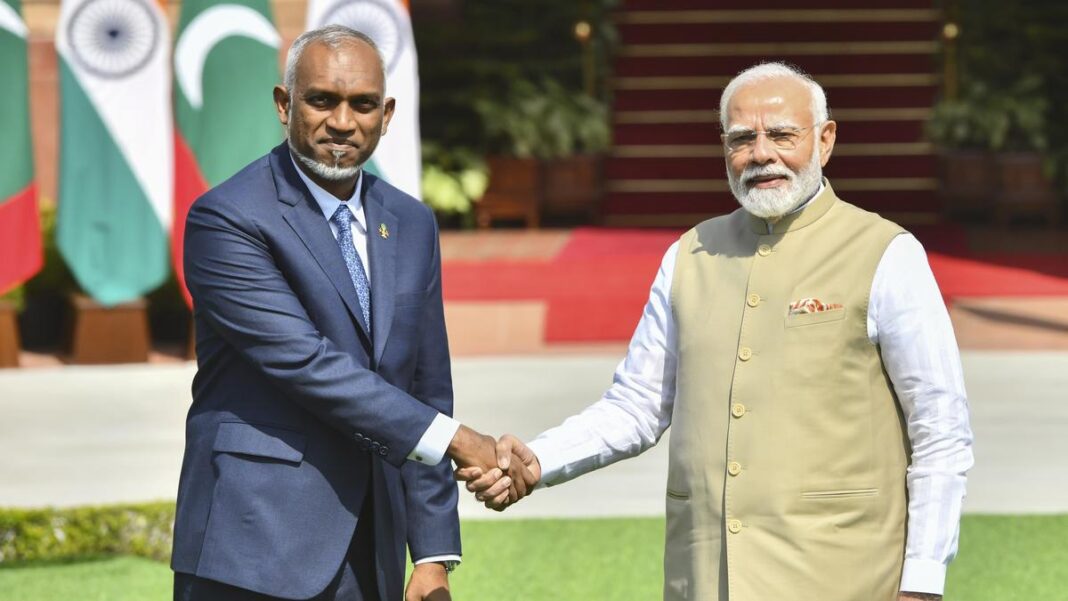Maldives President Mohamed Muizzu, known for his pro-China stance, is on his first visit to India after taking office. This trip comes at a crucial time when his country is facing a severe economic crisis. Despite his earlier campaign to reduce Indian influence, Muizzu has softened his approach toward India, recognizing the need for financial support to save his struggling economy. This visit is being seen as a significant move to repair relations between the two nations.
Background of Maldives-India Relations
The Maldives, a small island nation in the Indian Ocean, is strategically important due to its location on major global shipping routes. India has traditionally held strong ties with the Maldives, offering financial and developmental assistance over the years. However, relations became strained during Muizzu’s campaign when he pushed for a reduction of Indian presence in the country. He promised to remove Indian military personnel stationed in the Maldives and looked toward China for economic collaboration.
Now, as the country faces a severe economic downturn, Muizzu’s tone has changed. He is seeking to restore the once-close relationship with India, a key partner in the region.
Maldives’ Economic Woes
The Maldives is highly dependent on tourism, which makes up the majority of its economy. However, the COVID-19 pandemic and other global factors have led to a significant slowdown in tourism. As a result, the nation’s economy is struggling to recover, and its foreign reserves have depleted.
The country’s debt is currently estimated at 110% of its Gross Domestic Product (GDP). The Maldives owes large amounts of money to both India and China. It has borrowed heavily from these two nations, leading to a huge financial burden that now threatens to push the country into default.
One of the biggest concerns is the Maldives’ sukuk, a type of Islamic bond. There is growing fear that the country may not be able to make payments on this debt, making it the first Islamic bond to default globally. Analysts are warning that unless urgent action is taken, the Maldives could face an unprecedented financial crisis.
The Importance of Muizzu’s Visit
President Muizzu’s visit to India is critical for several reasons. Firstly, India is one of the Maldives’ largest lenders. Maldives owes about $400 million to India, and more financial help will be essential to avoid a complete economic collapse.
Before his trip to India, Muizzu made it clear that he recognizes the need for Indian support. Despite his earlier campaign rhetoric that focused on limiting Indian influence, he has acknowledged that India understands the financial problems his country is facing. India has already offered financial assistance to the Maldives, giving a $50 million lifeline last month to help with immediate debt payments.
During Muizzu’s visit, India introduced the Rupay card in the Maldives, aiming to strengthen economic cooperation between the two nations. Additionally, the leaders of both countries jointly inaugurated the runway of Hanimaadhoo International Airport, a vital infrastructure project for the Maldives. These developments signal a positive shift in relations between India and the Maldives.
India’s Role in the Maldives’ Economic Recovery
India has been an essential partner for the Maldives in recent years. Aside from offering direct financial assistance, India has been involved in multiple development projects in the island nation, including healthcare, education, and infrastructure initiatives.
In the face of the Maldives current financial troubles, India is likely to continue playing a significant role. One of the most critical moves being discussed is a $400 million foreign-currency swap between the Maldives and the Reserve Bank of India. This swap could provide the Maldives with much-needed funds to pay off its debts and avoid a default.
China’s Role in the Maldives
While India has been a long-standing partner of the Maldives, China has also made significant investments in the country. Under previous governments, the Maldives received heavy financial support from China, especially for large infrastructure projects like bridges, roads, and airports. They owe about $530 million to the Export-Import Bank of China, making China the country’s largest lender.
Muizzu’s campaign was initially focused on strengthening relations with China and moving away from India. He promised to start new projects funded by China and expressed interest in deepening ties with the Asian giant. As the financial crisis worsened, it became clear that the island nation would need help from multiple sources to avoid disaster. China has also held talks regarding debt relief, though no concrete agreements have been reached yet.
The Growing Debt Crisis
The countries debt crisis is becoming increasingly severe. According to Fitch Ratings, the island nation’s total external debt obligations will increase to $557 million by 2025 and surpass $1 billion by 2026. These are enormous sums for a small island nation with limited resources.
The Maldives Monetary Authority has stated that the country’s foreign reserves stand at only $437 million, barely enough to cover a month and a half of imports. With the tourism sector yet to fully recover, the country is running out of time to manage its growing debt.
There is increasing concern that if the Maldives cannot secure more financial aid or find a way to restructure its debt, it could face a full-blown financial crisis. Such a scenario would have significant consequences for the country’s citizens, who depend heavily on imported goods and services.
A Turning Point in Maldives-India Relations
President Mohamed Muizzu’s visit to India marks an important turning point in the relationship between the two nations. After campaigning on an anti-India platform, Muizzu has shifted his stance and is now looking to India for support during his country’s financial crisis.
India has responded positively, providing financial assistance and continuing its partnership with the Maldives through infrastructure and economic projects. As the country faces mounting debt and the threat of default, this visit may be a critical moment in the country’s efforts to recover and rebuild its economy. Muizzu’s ability to navigate the complex relationships between India, China, and other lenders will be key to determining the future of the Maldives economy.

